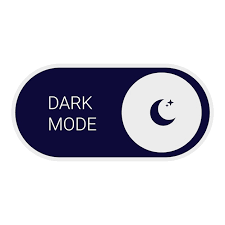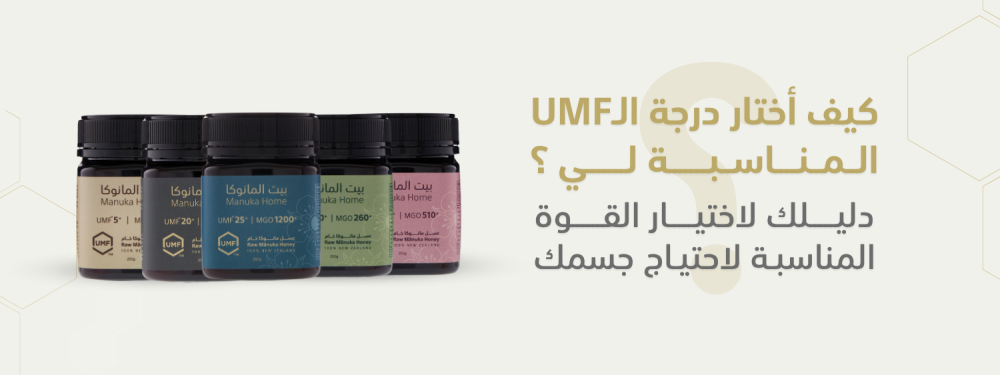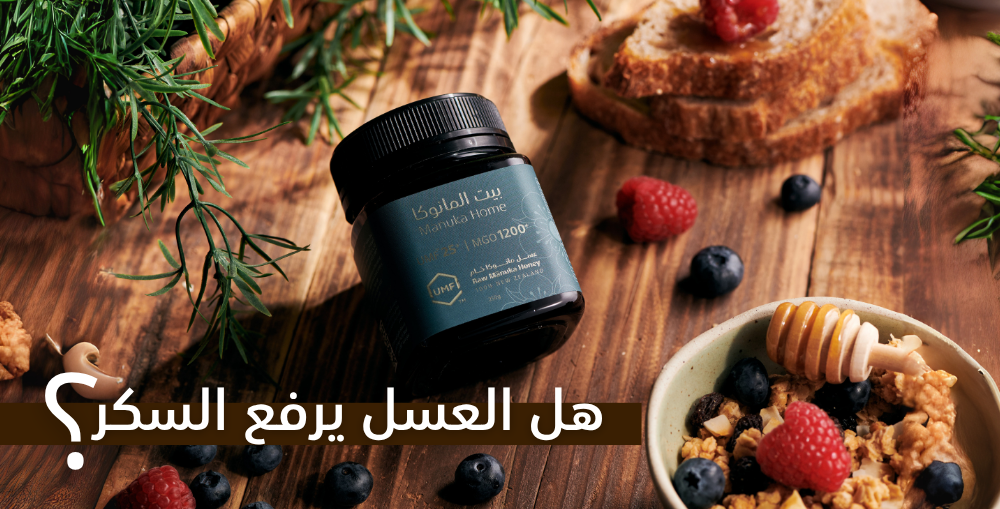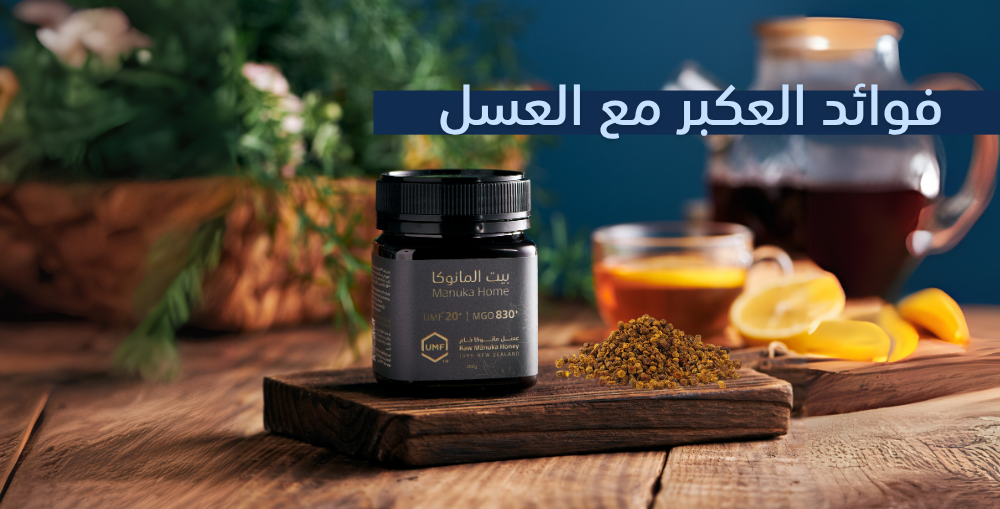New Zealand Manuka honey, known for its high nutritional value and unique healing properties, combines with propolis—a natural antibacterial and antioxidant-rich substance—to form an amazing combination that boosts your immunity and supports your overall health.
The benefits of propolis and honey are countless. This golden combination combines honey's superior anti-inflammatory and healing properties with propolis' antiviral and antibacterial properties, making it an ideal choice for improving respiratory health, supporting digestion, and boosting daily energy naturally and safely.
What is propolis?
Propolis, also known as bee propolis, is a sticky natural compound produced by bees from a delicate mixture of their saliva, hive wax, and plant resins they collect from tree bark and plant buds.
This vital compound is used inside the hive to protect young bees and nourish the queen, and is a natural defense against microbes.
Propolis is distinguished by its rich composition, which includes a wide spectrum of vital nutrients, such as proteins, vitamins, minerals, amino acids, essential fatty acids, enzymes, and organic acids, making it an effective element in supporting the body's vital balance.
Propolis is considered one of the most powerful natural compounds for strengthening the immune system, accelerating wound healing, and boosting energy levels, thanks to its unique antioxidant and antimicrobial properties.
What are the components of propolis?
To further understand the benefits of propolis with honey, it's important to note that the components of propolis vary greatly depending on the environment surrounding the bees. The nature of the trees and plants prevalent in the region influences the elements it contains. Studies have revealed the presence of more than 300 active compounds in its chemical composition. In general, propolis consists of:
- About 50% of plant resins are extracted from tree buds and bark.
- About 30% natural beeswax, which gives it its sticky texture.
- Approximately 10% volatile oils with antiseptic and aromatic properties.
- 5% pollen rich in proteins and vitamins.
Propolis is characterized by a high concentration of bioactive polyphenol compounds, primarily flavonoids, which are known for their powerful antioxidant properties. This makes propolis effective in combating inflammation, supporting the immune system, and preventing many chronic diseases.
Propolis also contains:
- Essential amino acids needed for cell building and renewal.
- A group of important vitamins, such as vitamin A to enhance vision and immunity, vitamin C to strengthen tissues, and vitamin E, which supports skin health and fights aging.
- Vital minerals such as potassium and magnesium, which play an important role in blood pressure balance and muscle function.
Propolis is not just a natural substance. It is a complex and unique chemical blend brimming with nutritional and therapeutic value, making it one of nature's most effective treasures for holistic health. The benefits of propolis combined with honey, especially monofloral Manuka honey , are endless.
What are the best types of propolis?
The finest types of propolis are those extracted from completely pure sources, free from any industrial interventions or chemical additives. They are collected from beehives that forage in unpolluted natural environments where wild plants and trees rich in resins are abundant.
Dark brown to black propolis is considered the most popular and distinguished in terms of quality and high concentration of active compounds.
To avoid fraud and ensure effectiveness, it is recommended to choose propolis from reliable apiaries known for their commitment to pure production standards and strict environmental specifications.
What are the benefits of propolis with honey?
What are the benefits of mixing propolis and honey together? This is a common question many people ask, as there are amazing health benefits to combining Manuka honey with natural propolis. Some of the most important benefits of propolis and honey include:
Strengthening immune defenses:
Propolis is a rich source of active flavonoids, which have powerful antioxidant properties that help stimulate the body's immune response.
As for original Manuka honey , it is distinguished by its high ability to fight bacteria and viruses, which enhances the body's ability to combat infection and prevent disease.
Anti-inflammation and disease resistance:
Propolis is known as a broad-spectrum natural antibiotic, effectively combating harmful bacteria and fungi. Meanwhile, Manuka honey contains therapeutic enzymes that speed up the healing process and reduce inflammation, especially in cases of sore throat and tonsillitis.
Support digestive health:
Among the benefits of propolis with honey for the stomach are eliminating harmful intestinal microbes such as Helicobacter pylori (stomach bacteria), in addition to soothing the digestive system and improving nutrient absorption, thanks to its soothing and anti-ulcer properties.
Skin care and accelerate wound healing:
Propolis has effective antimicrobial properties. One of its most important benefits for the skin is that it protects against skin infections and speeds up recovery. Honey, on the other hand, is a natural moisturizer that helps regenerate skin cells and speeds up the healing of wounds and burns.
Promote heart and artery health:
The flavonoids in propolis help lower harmful cholesterol levels and improve blood flow, supporting vascular health.
Manuka honey contains antioxidants that protect the arteries from hardening and reduce the risk of heart disease.
Increased physical activity and vitality:
Honey is a fast-absorbing source of natural energy, thanks to its beneficial sugars, while propolis supports physical performance by boosting the immune system and combating fatigue caused by stress.
Contributing to tumor prevention:
Preliminary research suggests that propolis contains unique compounds that may slow the growth of cancer cells, thanks to its antioxidant and anti-inflammatory properties.
Promoting oral and dental health:
Propolis has the ability to eliminate bacteria that cause gum disease and cavities, while honey soothes mouth infections and promotes rapid healing of sores.
Manuka honey and propolis blend is your golden option for improving overall health in a natural and safe way, combining the wisdom of nature with the effectiveness of modern medicine. Order it now from the Manuka House store in the Kingdom of Saudi Arabia.
What are the benefits of propolis for women mixed with Manuka honey?
The benefits of propolis and honey for women are numerous. This combination offers comprehensive health and beauty benefits for women, as it contains effective compounds that support hormonal balance, improve psychological well-being, and enhance skin beauty. Here are its most prominent benefits for women:
- Propolis is rich in antioxidants that reduce the effects of free radicals, thus contributing to reducing wrinkles, improving skin elasticity, and maintaining youthful skin.
- Thanks to its anti-inflammatory and antioxidant properties, propolis helps improve the uterine environment and increases the chances of pregnancy by supporting reproductive health.
- Propolis contributes to a natural hormonal balance, which helps alleviate the symptoms of premenstrual syndrome (PMS) and polycystic ovary syndrome (PCOS).
- The antifungal and antibacterial properties of propolis make it an ideal choice for supporting intimate area health and preventing recurrent vaginal infections.
- Propolis contains natural compounds that help relieve stress and improve mood, especially during critical periods such as menstrual cycle fluctuations.
- Propolis with honey boosts the body's immunity and contributes to skin cell renewal, protecting it from environmental factors and delaying the appearance of premature signs of aging.
Whether you're looking for hormonal balance, a natural glow to your skin, or emotional support during difficult times, combining Manuka honey for women with propolis offers you all of this in one rich and effective blend.
What are the benefits of propolis with honey for men?
The benefits of propolis mixed with honey are not limited to women only. Rather, this natural mixture constitutes a complete source of strength for men, whether in terms of physical or sexual performance or immunity. Here are the most prominent:
Benefits of propolis with honey for men:
Stimulate physical activity and raise energy levels
Thanks to its ability to improve the body's efficiency in converting food into energy, propolis is a natural stimulant for raising physical activity levels and increasing endurance, especially for men who exercise or work in physically stressful conditions.
Improve sexual performance and blood circulation
Propolis and Manuka honey for men help increase blood flow to various parts of the body, leading to improved sexual performance and increased desire. It also contains natural compounds that reduce stress and improve mood, two key factors in enhancing sexual ability.
Support prostate health and reduce inflammation
Propolis plays an important role in maintaining prostate health, as it helps reduce inflammation in the reproductive system and reduces the risk of developing an enlarged prostate or tumors thanks to its antioxidant properties.
Strengthening immunity and enhancing disease resistance
Rich in antiviral and antibacterial properties, propolis and Manuka honey boost a man's immune system, providing natural protection against common diseases and maintaining daily energy and strength.
In short, Propolis honey is an effective natural supplement that provides men with comprehensive immune support and sexual potency in a single, all-natural formula, extracted from the heart of the beehive.
What are the harms of propolis with honey for women and men?
Despite the benefits of propolis with honey, this combination may not be suitable for some cases. Among its most prominent potential side effects are:
- Aggravation of asthma symptoms: Some of its ingredients may stimulate respiratory irritation, so asthma patients are advised to avoid it.
- Increased risk of bleeding: It slows blood clotting, which may increase the likelihood of bleeding, especially in women with bleeding disorders or before surgery.
- Allergic reactions: Not to be used by those who are allergic to honey or bee products.
- Mouth irritation: May cause mouth ulcers in some people.
How to use propolis with honey
Combining propolis with 1 kg of Manuka honey is an effective natural formula that offers multiple health benefits, provided you adhere to the recommended daily dose, which should not exceed 70 milligrams of propolis per day.
It is important to note that some individuals may exhibit allergic reactions to propolis, which requires an initial trial with a small amount. As for how to use propolis with honey, it is as follows:
First: Propolis ointment with honey to treat skin wounds
One of the benefits of propolis with honey is that it works as a powerful antibacterial and anti-inflammatory for skin infections, especially in cases of deep or chronic wounds.
Preparation method:
- 3 teaspoons of pure propolis powder.
- 7 tablespoons of raw natural honey.
Mix ground propolis with honey well until smooth, then apply it topically to wounds or inflammation to speed up healing and support skin cell regeneration.
Second: How to use propolis to strengthen immunity
A mixture of propolis and honey can be taken in regular doses on an empty stomach in the morning, which boosts the body's resistance to disease and improves energy levels. It is preferable to mix equal amounts of propolis extract and honey and take it daily as part of a healthy routine.
Third: Propolis and honey spray for throat infections
It is one of the most common and effective uses, especially for treating bacterial infections in the mouth and throat.
Preparation method:
- 3 teaspoons of propolis extract.
- 2 tablespoons of natural honey.
- A spoon of warm water.
Mix the mixture well and store it in a spray bottle. Use it by spraying it directly into the mouth and throat to relieve pain and eliminate germs naturally.
When you combine propolis with honey, you get a golden blend that supports your health from the inside out in a safe, natural, and effective way. Contact us now and get the best types of Manuka honey.
Other ways to use propolis honey according to the purpose
Here are the top 7 innovative ways to use propolis honey to boost health and wellness:
To purify the skin and renew its freshness
Mix equal amounts of propolis honey with natural coconut oil, apply it to your face for 15 minutes as a nourishing mask, then rinse it off with lukewarm water for a healthy glow.
Supports quality sleep and nighttime calming
Dissolve a teaspoon of propolis honey in a cup of warm milk, and drink the mixture an hour before bed to calm the nerves and improve sleep quality.
Relieve stomach inflammation before meals
Take a teaspoon of propolis honey before each main meal to help soothe the stomach and reduce intestinal inflammation.
Improving cardiovascular health
Mix a teaspoon of propolis honey in lukewarm water with a pinch of cinnamon, and drink it in the morning to improve blood circulation and strengthen the heart.
Natural Daily Mouthwash
Dissolve a teaspoon of propolis honey in half a cup of warm water and rinse your mouth with it daily to help cleanse the gums and freshen your breath.
Soothing blend for colds
Add a spoonful of propolis honey to a cup of hot ginger tea to reduce congestion and relieve cold and flu symptoms.
Promote digestion and stimulate the intestines
Mix a teaspoon of propolis honey with half a teaspoon of olive oil, and take the mixture on an empty stomach in the morning to improve digestion and regulate bowel movements.
The uses of Manuka honey and propolis packages range from daily care to preventative health. Make this natural elixir part of your routine and enjoy its comprehensive benefits for better health for you and your family.
How can I use ground propolis with honey?
To get the most out of propolis with honey, especially ground propolis, mix it with natural honey or dissolve it in lukewarm water. Then, take a teaspoon twice daily. It is preferable to take the first dose in the morning on an empty stomach for better absorption.
Important Notice: It is recommended to consult a doctor before starting use, especially for those with a history of allergies to bee products, to avoid any unexpected reactions.
What are the precautions and contraindications for using propolis?
Despite its extensive health benefits, using propolis may not be suitable for everyone. There are some cases that require extreme caution or abstaining from using it, including:
Potential drug interactions
Caution should be exercised when using propolis in conjunction with other medications or supplements, especially:
- Warfarin : This is a blood thinning medication. Propolis may increase its effect and increase the risk of bleeding.
- Herbs and supplements that slow blood clotting, such as ginger, garlic, ginkgo, and ginseng , may be combined with propolis to cause unexpected bleeding.
- Drugs metabolized by the hepatic enzyme CYP450 , propolis may affect their absorption or effectiveness.
Bleeding risks and their effect on blood clotting
Propolis reduces blood clotting, which may pose a risk to people with bleeding problems or those undergoing surgery.
Therefore, it is recommended to stop using it well before any surgical procedure, to avoid any complications.
Possibility of an allergic reaction
Propolis should not be used if there is a known allergy to bee products such as honey or bee stings. People with pollen allergies may also be more susceptible to an allergic reaction to propolis.
Medical Warning: Before taking propolis as a natural supplement, it is essential to consult a physician, especially for those taking regular medications or suffering from chronic health conditions. Despite the many benefits of propolis and honey, caution is required to maintain overall health.
How to get propolis and honey?
Propolis is available throughout the Kingdom of Saudi Arabia. You can find it at grocery stores, and it's also widely available in pharmacies, but in various forms. You may find it as a moisturizing and nourishing ointment for the skin, or in the form of nourishing capsules and oral tablets. It's also available as a liquid extract that can be taken orally.
As for the original Manuka honey, it is available on the Manuka House website in the Kingdom of Saudi Arabia. You can easily get it online. Don't forget the wooden honey spoon to eat honey the right way, as it preserves the quality of the honey and extends its shelf life without spoiling or changing its internal properties.
What is the permissible amount of propolis?
One of the questions that many people who love to benefit from the benefits of propolis with honey have is how many times a day should propolis be taken?
What is the correct way to take propolis with honey? It is best to take this mixture orally, once daily. Ideally, the propolis should be in the amount of 1 to 2 grams, dissolved in a 500 ml cup of water and mixed with one to two tablespoons of Manuka honey. This should be taken for at least 13 months to ensure the desired results.
Frequently Asked Questions
When does the effect of propolis appear?
Results typically begin to appear after about two weeks of regular use. Studies have shown that approximately 76% of women noticed an overall improvement, while 87% reported an improvement in at least one symptom within 14 days.
Is propolis considered an antibiotic?
Yes, propolis is a natural antibiotic, as it contains flavonoids that are effective in combating bacteria and fungi. Among the benefits of propolis combined with honey are its ability to slow the growth of cancer cells, delay the signs of aging, and help treat skin problems such as acne and dark spots. In addition, it plays a role in supporting normal blood sugar balance.
Are there any side effects to taking propolis honey?
Despite the benefits of propolis with honey, it may cause an allergic reaction in some people, especially those who are allergic to bee products. Therefore, it is recommended to try a small amount first and monitor the body.
Does propolis boost immunity?
Indeed, propolis is known for its rich composition, which includes more than 250 active ingredients, giving it an effective ability to support the immune system and enhance the body's resistance to diseases and infections.
Does propolis treat colon?
Yes, propolis powder helps relieve colon inflammation, soothe the lining of the digestive tract, and facilitate digestion. This is due to its powerful antioxidant content, which naturally improves colon health.
What is the difference between propolis and propolis honey?
Propolis is a natural sticky substance collected by bees from plants, while propolis honey is a mixture that combines natural honey and propolis extract, combining the benefits of each into one product.
Can you eat propolis honey daily?
Yes, it can be consumed daily in moderate amounts, ranging from one to two teaspoons at most, to obtain its benefits without overdoing it.
Is propolis honey suitable for children?
It is preferable to give it to children over the age of three, after consulting a specialist doctor and giving it in small doses at first.
Does propolis honey help treat stomach bacteria?
Yes, medical studies have shown its effectiveness in combating Helicobacter pylori, which is the main cause of stomach ulcers.
What are the benefits of propolis with honey for pregnancy?
It contributes to improving fertility in women and helps regulate hormonal balance, which increases the chances of conceiving naturally.
How to store propolis honey?
Store in a cool, dry place, away from direct sunlight, to maintain its properties and quality for as long as possible.
What diseases does propolis treat?
Propolis treats respiratory infections, mouth ulcers, and some types of bacterial and fungal infections.
How much propolis can be mixed with honey?
1-2 grams of propolis is usually used daily mixed with a spoonful of honey.
Does propolis purify the body from toxins?
Yes, it contains antioxidants that help reduce the effect of toxins in the body.
What is the best time to take propolis?
It is best taken in the morning on an empty stomach to enhance absorption and benefit.
Is propolis good for the nerves?
Yes, it has anti-inflammatory and antioxidant effects that support nerve health.
What are the benefits of propolis for sleep?
It helps improve sleep quality thanks to its calming effect and also reduces stress.
Finally, the benefits of propolis with honey are countless, but caution should be exercised and it should not be used with young infants. A specialist doctor should be consulted before consuming it to ensure it is completely free of any contraindications that could cause serious harm. Order original Manuka honey now from the Manuka House website in the Kingdom of Saudi Arabia and enjoy the many benefits and advantages to support your health and the health of your family.









